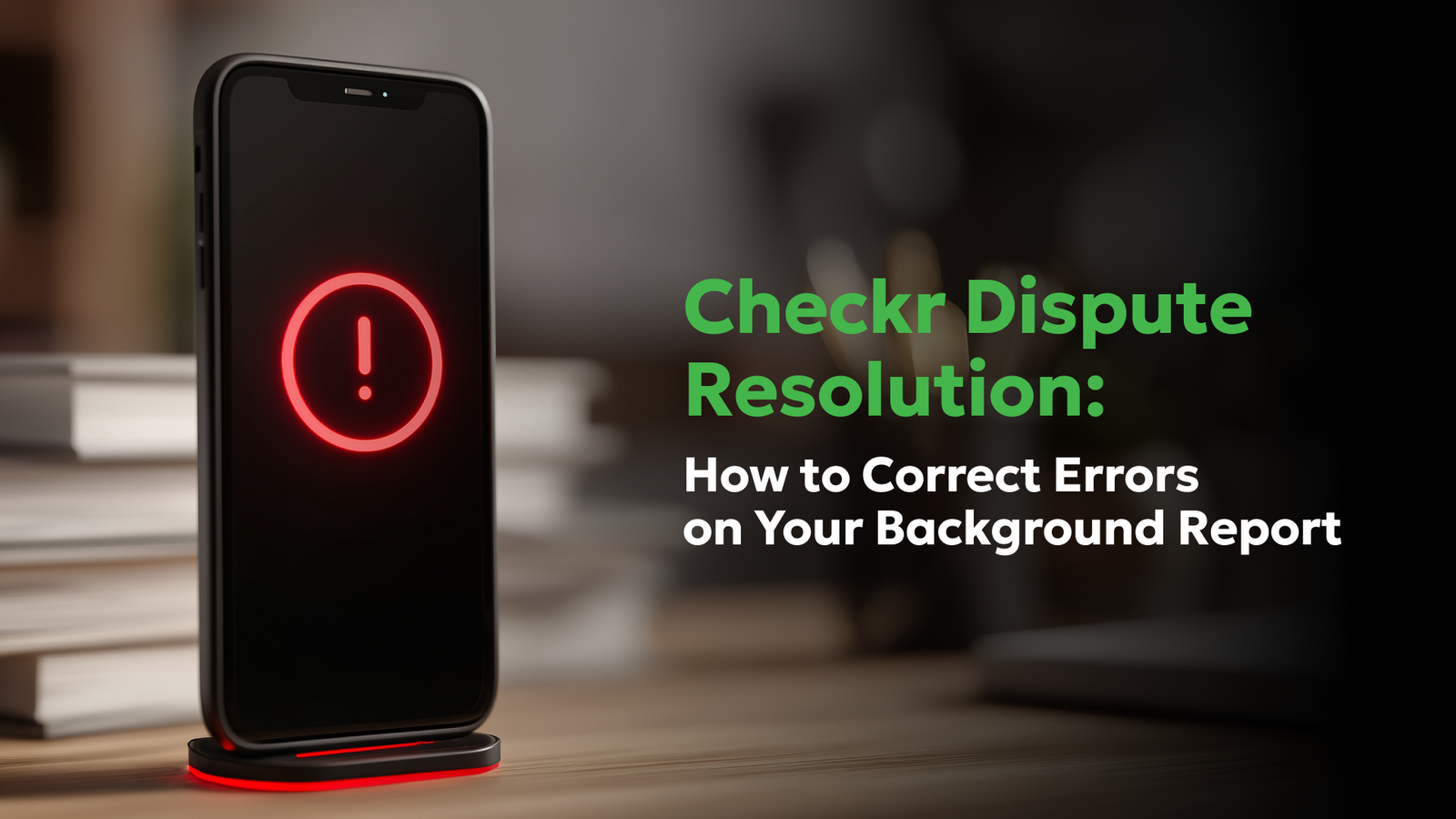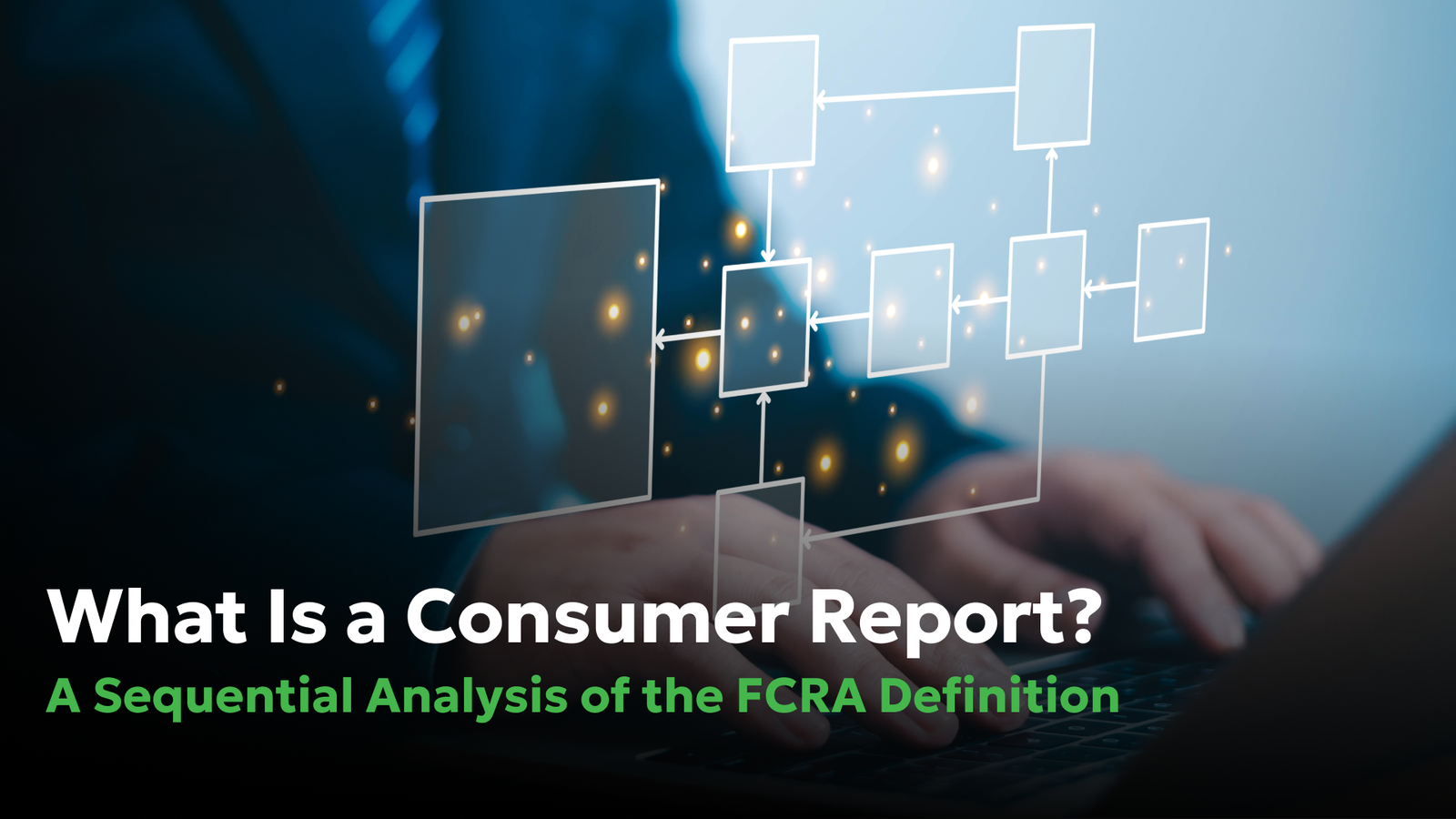The Fair Credit Reporting Act (FCRA) & Background Checks
- Blog
- All about FCRA
The Fair Credit Reporting Act (FCRA) & Background Checks

FCRA Compliance and Your Rights - What Applicants Need to Know About Background Checks
Don’t let errors impact your job prospects. Discover how FCRA compliance works to keep your background check fair, transparent, and accurate. Know the steps employers must follow.
Whether you’re an employer conducting background checks, a company running reports, or an applicant undergoing one, knowing your rights and obligations under the Fair Credit Reporting Act (FCRA) is crucial. The FCRA dictates how background information can be collected and reported, and gives you protections if your rights are violated.
Background checks have become and will likely remain a standard and expected part of the hiring process. The job market is competitive so employers have the leverage to confirm the truth of what job applicants say and to omit anyone with a red flag from consideration. Additionally, increased digitization and improved cyber-infrastructure means data, including personal data, is more readily available and cheaper than ever before. And, the stakes are higher for employers than ever before. Hiring one “bad apple” can have devastating consequences for a company’s operations and reputation.
It’s understandable that employers have concerns about hiring the right employees. But our clients have equally important concerns - and they suffer greatly when background check companies make mistakes. Unfortunately, many come to us after facing heartbreaking setbacks caused by background check companies that fail to comply with FCRA regulations. This non-compliance has unfairly cost them valuable opportunities they’ve earned - from job promotions and new positions to driving for rideshare companies, and more.
Don’t wait until an error costs you an opportunity. If you have questions about a background check or suspect a company has mishandled your information, we’re here to help!
What Exactly Is an FCRA Background Check?
By this point, you may be asking “What is an FCRA background check?” - Great question!
An FCRA background check follows legal guidelines to ensure accuracy and fairness in using consumer info.
An FCRA background check provides an easy and relatively quick way for employers to protect themselves and take one extra step in hiring someone reliable. An employer, or potential employer, uses background checks to:
- Verify the information that the job applicant offers them.
- Look for anything to suggest the job applicant is less than reliable.
- Identify anything to suggest the applicant might pose a threat to the employer or its other employees.
That’s fair: employers just want to make an informed decision based on accurate data. However, with this practice comes a responsibility to respect and protect the rights of applicants and employees.
The Fair Credit Reporting Act (FCRA) provides the legal framework for how employers should conduct these background checks.
Rights and Obligations - FCRA
Everyone - employees and employers - needs to understand their rights and obligations under the FCRA - whether you are an employer conducting background checks or an applicant on the cusp or in the midst of one.
The FCRA dictates how background companies should collect and use information and provides specific protections and avenues for recourse if anyone violates those rights. Knowing these rights can help job applicants ensure that they are treated fairly and that any decisions about their employment are based on accurate and complete information.
On the other hand, employers must navigate the complex requirements of the FCRA to avoid legal pitfalls and ensure that their hiring practices are fair and compliant. Any failure to follow FCRA guidelines can lead to significant legal and financial repercussions and damage to an organization's reputation.
Therefore, it is in the best interest of both parties to fully understand and comply with the provisions of this law. This article provides an overview of the FCRA, its importance for employers, how to conduct an FCRA-compliant background check, employer responsibilities, the consequences of non-compliance, and what to do if your employer violates the FCRA.
What is the FCRA?
The FCRA is a federal law enacted in 1970 to promote the accuracy, fairness, and privacy of information in files maintained by consumer reporting agencies (CRAs). The FCRA governs how CRAs and background check companies collect, use, and share consumer information, with whom they can share it, and how they can share it. The FCRA is crucial for protecting consumer rights and ensuring that the information used in credit reports and background checks is accurate and fair.
The FCRA covers a broad range of information, including credit history, criminal records, and other personal data. When it comes to employment, the FCRA sets specific guidelines for conducting background checks to ensure that employers and potential employers treat job applicants and employees fairly.
The legal framework governing background checks also understands that employers must keep their workplaces safe. Employers need to know that when they hire someone, they are hiring someone who is reliable and trustworthy and not a threat to the other employees, the employer’s reputation, or the employer’s business. So it provides a clear outline for how to do it.
What is FCRA Compliance and Why Do Employers Need to Be FCRA-Compliant?
For employers, FCRA compliance means following specific procedures when requesting and using background checks for employment purposes. An FCRA-compliant background check safeguards the rights of the screened individual. It safeguards the employer by establishing a paper trail to prove that the employer received all necessary disclosures and authorizations.
Employers need to be FCRA-compliant for several reasons.
| Compliance | Non-Compliance |
|---|---|
| It’s the law. Avoid legal consequences, including fines and lawsuits. | Legal consequences: fines and lawsuits. |
| Applicants appreciate your respect for their rights. Generate goodwill and ensure fair treatment. | Reputational damage and stockholder dissatisfaction. |
| Avoid litigation. Save on legal costs and avoid reputational damage. | Expensive legal battles. |
| Building Trust. Foster a positive work environment and enhance reputation. | Loss of trust and a hostile work environment. |
Employer Responsibilities Before Requesting a Background Check
Employers have several responsibilities before they even request a background check. FCRA requirements for employers require that employers do the following:
- Provide clear disclosures. Employers must clearly and conspicuously inform applicants or employees that a background check will be conducted in a standalone document.
- Obtain written authorization. Employers must obtain written authorization from the individual before conducting the background check. This ensures that the individual is aware of and consents to the screening process.
- Certify compliance with the background check provider. Employers must certify to the background check provider that they have obtained the necessary authorization, will comply with FCRA requirements, and will not misuse the information obtained.
- ONLY use FCRA-compliant background check providers. They may be a little more expensive, but employers should select background check providers that comply with FCRA regulations to ensure the accuracy and legality of the information collected.
How to Conduct an FCRA-Compliant Background Check
To conduct a background check in compliance with the Fair Credit Reporting Act (FCRA), employers must follow a series of steps to ensure transparency, accuracy, and fairness.
Step 1: Provide a Clear Disclosure
Before beginning a background check, employers are required to give the applicant or employee a clear and separate written disclosure. This disclosure informs the individual that a background check will be conducted and must be a standalone document, not included as part of other employment paperwork or applications.
Step 2: Obtain Written Authorization
After disclosing the background check, employers must receive written consent from the applicant or employee. This authorization can be included along with the initial disclosure, and the person being screened must sign it to confirm their agreement.
Step 3: Use a Reputable, FCRA-Compliant Background Check Provider
To ensure compliance with FCRA regulations, employers should choose a reputable background check provider that adheres to FCRA guidelines. This step helps ensure the information gathered is accurate and compliant with federal standards.
Step 4: Review the Background Check Report
Once the background check is complete, employers should carefully review the report. If any negative information appears that may affect the hiring decision, the employer must follow specific FCRA-mandated procedures before taking adverse action.
Step 5: Pre-Adverse Action Notice
If an employer decides to consider an adverse action, such as not hiring the applicant based on the background check, they must first provide the individual with a pre-adverse action notice. This notice includes a copy of the background check report and a summary of the person’s rights under the FCRA.
Step 6: Allow Time for Response
After issuing a pre-adverse action notice, the employer should give the applicant or employee time to review the report and dispute any inaccuracies. Typically, this response period ranges from five to ten business days, giving the individual a fair opportunity to address any issues.
Step 7: Adverse Action Notice
If, after considering any disputes, the employer decides to proceed with the adverse action, they must send the individual an adverse action notice. This notice should contain the background check company’s contact information, a statement explaining that the background check company did not make the adverse decision, and information on the individual’s right to dispute the report or request a free copy within 60 days.
By following these steps, employers can ensure a fair and transparent process when conducting background checks, upholding FCRA standards while respecting applicants' rights.
Fair Credit Reporting Act Criminal Background Checks
FCRA criminal checks require employers to maintain compliance by disclosing intent, obtaining consent, and allowing applicants to dispute inaccuracies in criminal records.
We’ve discussed what a Fair Credit Reporting Act background check is and what’s expected of employers. Now let’s delve a bit into the Fair Credit Reporting Act and criminal background checks. Similar to a “regular” background check, FCRA criminal background checks require that employers are compliant and follow the rules set forth according to federal laws.
Under the Fair Credit Reporting Act (FCRA), employers conducting criminal background checks must follow strict guidelines. Criminal background checks are not different from other background checks, except for the fact that they review an applicant's criminal records. Employers must disclose their intent to the applicant, obtain written authorization, and provide a copy of the report if it impacts their decision. This process ensures transparency and gives applicants the chance to dispute any errors.
What are the Consequences of FCRA Non-Compliance?
Non-compliance with the FCRA can result in severe consequences for employers, including:
- Lawsuits, Lawsuits, and more Lawsuits. Employers who fail to comply with FCRA requirements can (and will) face lawsuits from those job applicants or employees affected by those violations. These lawsuits can result in significant legal penalties, including statutory damages ranging from $100 to $1,000 per violation, actual damages, punitive damages, and attorney’s fees.
- Reputational damage. Non-compliance can really hurt an employer’s reputation and make it challenging to attract and retain top talent. It can also damage relationships with current employees and stakeholders.
- Operational disruptions. Legal battles and the resulting penalties can and will create significant operational disruptions and divert resources and attention away from the core business.
- Government enforcement actions. Federal and state agencies may take enforcement actions against non-compliant employers, which can result in additional fines and sanctions.
What to Do If Your Employer Violates the FCRA
If you believe your employer has violated the FCRA, there are several steps you should take to protect your rights.
Document the Violation
To address a violation of your rights under the Fair Credit Reporting Act (FCRA), start by thoroughly documenting the issue. Keep detailed records of all relevant materials, including disclosures, authorizations, background check reports, and any correspondence with your employer. These records will be essential if you need to pursue further action.
Dispute Inaccurate Information
If you believe the FCRA requirements for background checks have not been met or your background check contains inaccurate or incomplete information, dispute it with the background check provider. Under the FCRA, the provider must investigate any disputed information and correct any verified errors, ensuring your background check accurately reflects your history. We recommend disputing via certified mail and not online because disputing online requires you to waive rights you will need later in the dispute process.
Seek Legal Advice
Seek legal advice from a consumer protection attorney experienced in FCRA violations. Attorneys, such as those at Consumer Attorneys, can review your case, clarify your rights, and recommend a tailored approach specific to your situation. Every case is unique, so working with an attorney with background check (FCRA) experience helps ensure that the strategy matches the specifics of your experience.
File Complaints
In some cases, your attorney may suggest filing a complaint with the Consumer Financial Protection Bureau (CFPB) or the Federal Trade Commission (FTC). These agencies can investigate and take action against employers who fail to comply with the FCRA.
Take Legal Action
If the violation has caused harm, such as job loss or damage to your reputation, legal action may be an option. An attorney can guide you through filing a lawsuit and seeking compensation. Contacting an background check attorney early in the process can help you prepare for potential litigation and safeguard your rights effectively.
The Fair Credit Reporting Act (FCRA) protects job applicants and employees by mandating that employers conduct background checks fairly, responsibly, and accurately. Employers must comply with FCRA requirements to avoid legal consequences and protect individuals' rights.
Contact Background Check Attorney
Frequently Asked Questions
A Fair Credit Reporting Act (FCRA) background check is a screening process governed by the FCRA. The FCRA ensures accuracy, fairness, and privacy in handling consumer information. Because background checks usually involve the review of an individual's credit history, criminal records, employment history, and other personal data, employers must follow specific guidelines. These guidelines include providing clear disclosures, obtaining written consent, and using reputable background check providers. If the employer considers adverse action based on the report, the employer must follow additional procedures such as issuing pre-adverse and adverse action notices. This process ensures the individual's rights are protected throughout the background check.
An FCRA background check typically takes a few days to a week. The exact time will vary based on several factors, such as the scope of the check, the efficiency of the background check provider, and the responsiveness of the institutions being contacted for information. Complex checks involving detailed criminal history, employment verification, international verifications, and educational background might take longer. Employers should allow adequate time for the process to ensure accuracy and compliance with FCRA guidelines, which mandate thorough and fair handling of background information.
An FCRA-compliant background check adheres to the rules and guidelines set forth by the Fair Credit Reporting Act (FCRA). This includes the employer providing the individual with a clear, written disclosure that it will be doing a background check, obtaining their written consent, and using a reputable background check provider. Employers must also provide a pre-adverse action notice if they plan to take any sort of adverse employment action based on the report, allowing the individual time to dispute inaccuracies. Finally, an adverse action notice must be given if the decision is finalized. These steps ensure the process is fair, accurate, and respectful or privacy rights.
Yes, the Fair Credit Reporting Act (FCRA) applies to criminal background checks. The FCRA sets guidelines for how consumer reporting agencies and employers handle criminal background information. This includes obtaining written consent from the individual before conducting the check, providing clear disclosures, and following specific procedures if the information in the report leads to adverse action, such as not hiring the applicant. The FCRA ensures that criminal background checks are conducted fairly, accurately, and with respect for the individual's privacy rights. Compliance with these guidelines is crucial for both employers and reporting agencies.


Daniel Cohen is the Founder of Consumer Attorneys. Daniel manages the firm’s branding, marketing, client intake and business development efforts. Since 2017, he is a member of the National Association of Consumer Advocates and the National Consumer Law Center. Mr. Cohen is a nationally-recognized practitioner of consumer protection law. He has a we... Read more
Related Articles




R
ONGS™You pay nothing. The law makes them pay.







